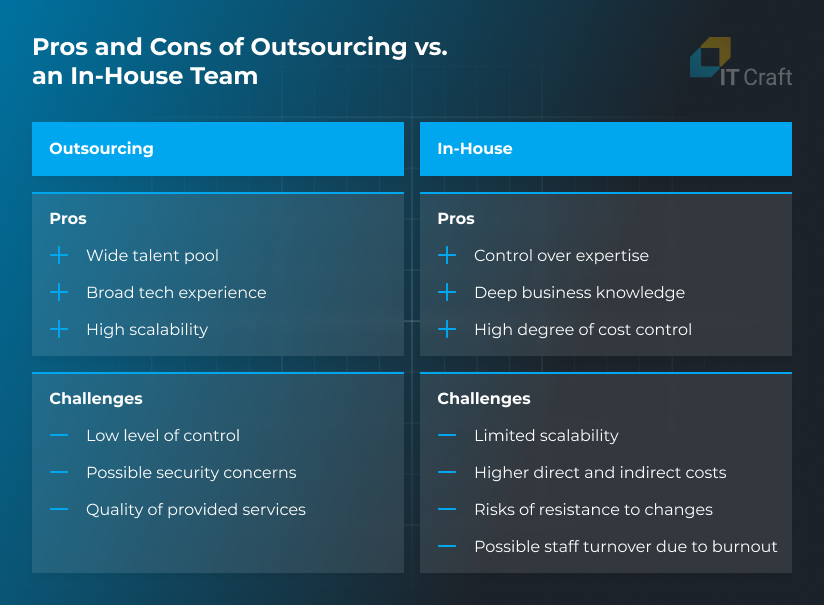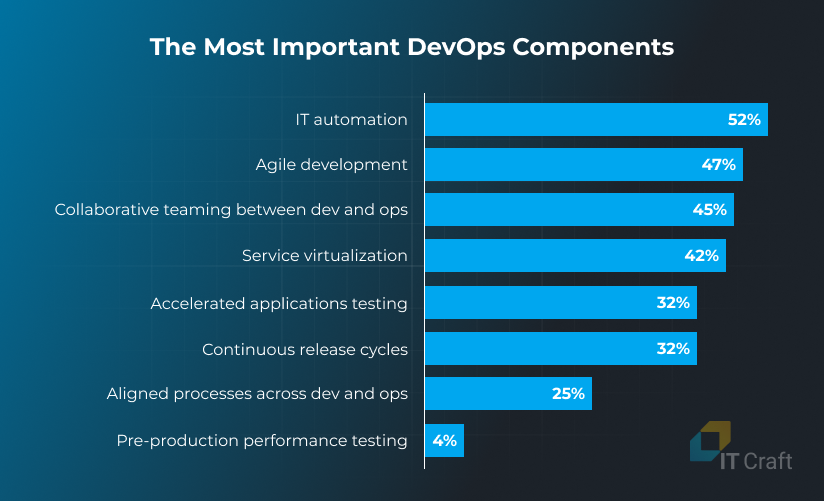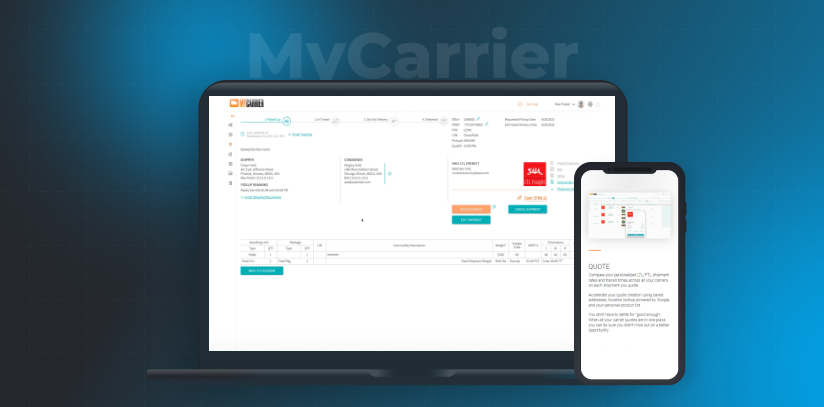DevOps keeps establishing itself as a valuable part of the software development cycle. It is indispensable for projects facing growth and expansion challenges.
With the help of DevOps, developers upgrade software faster and with higher source-code quality.
Still, risks of failed implementation or, at best, under-delivered value are high.
Why?
Expertise is crucial. Imperceptible details impact chances of success.
When no expertise is available, DevOps outsourcing is—and can help. Turning to an established, experienced partner mitigates risks and allows businesses to work out the best implementation path.
Below we discuss key points of a successful DevOps implementation and issues to consider for companies planning to outsource DevOps.
Use cases are also included. Keep reading!
1
What is DevOps Outsourcing?
DevOps outsourcing, a.k.a. DevOps-as-a-Service, means shifting DevOps activities to a responsible, reliable third-party organization.
This third-party organization assigns a DevOps engineer or a dedicated team that:
- focuses on constant software optimization
- improves delivery processes
- creates disaster recovery
- analyses and improves infrastructure
- introduces automation
and more.
Scope depends on client needs.
All businesses choosing to outsource DevOps services can expect a systematic improvement.
DevOps engineers work in tight cooperation either with the client’s in-house team or another outsourcing team integrating improvements throughout the development cycle.
Apart from working directly on a project, DevOps providers also outsource consulting on effective DevOps processes.
2
Benefits of DevOps Outsourcing
A few direct and indirect benefits for businesses that prefer to outsource DevOps:
- Immediate start. An outsourcing team takes over the project as soon as the client and provider agree on cooperation terms.
- Expertise. Outsourcing DevOps professionals work on different project types, collecting broad competence.
- Knowledge sharing. DevOps team suggests an in-house team on best practices based on previous expertise.
- Budget optimization. Businesses save overhead costs. Also, cost-saving hourly rates are available in top-rated foreign locations, e.g., in Eastern Europe.
- Flexibility. Outsourcing providers adjust team squads and roles based on changing needs. A vast talent pool is available.

2
DevOps Outsourcing vs. In-House Teams: Pros and Cons
Either an outsourcing or an in-house team can be good options for your project.
Which one you choose for yours depends on the following:
- desired speed of implementation
- assigned budget
- existing workflows and practices
- security requirements
When you plan to adopt DevOps, consider the following points:
Project start
A discovery phase might be required in both cases. The team needs to become acquainted with the current state of affairs.
Still, hiring and onboarding an in-house DevOps team takes time.
Professional outsourced DevOps engineers start immediately, as stated above.
Working with an outsourced team might be more beneficial under a tight deadline.
Communication
DevOps engineers do not do the job alone. The entire development pipeline is involved. Be ready for changes in work processes.
An in-house team will have to build communication both inside the team and with other departments.
An outsourcing team has an established workflow. Only integration to client processes might be required.
A reliable, experienced team—this applies to both in-house and outsourcing—offers transparent communication. It provides justified estimates and clear deadlines. DevOps engineers respond fast to requests from other team members.
The rule of thumb is to choose an established service provider with the same or similar cultural background.
Legacy projects
DevOps might not be enough for projects that are not Agile.
It is possible that neither in-house DevOps nor an outsourcing team can achieve desired results. Improvements in software infrastructure might not meet expectations for legacy systems.
Digital transformation is required for old software, taking the scope of work to another level. Businesses might consider such options as in-house team expansion or a dedicated outsourcing team having experience in project modernization.
Whatever option you choose, ensure your team understands the importance of DevOps and buy into fruitful cooperation.
Security
Businesses might not be capable of adopting DevOps due to contractual and legal limitations. If so, it makes sense to initiate a consultation with an expert to analyze where possible improvements can be made and to what extent.
On the bright side, such cases are rare. For instance, IT Craft engineers have successfully optimized solutions in regulated industries such as FinTech and healthcare.

4
What to Expect from DevOps-as-a-Service
Two key activities are optimization and automation.
The range of a DevOps team’s responsibilities is broad and highly contextual. It varies from project to project.
DevOps engineers usually focus on issues related to:
- app deployment
- app infrastructure optimization
- workflow alignment across development and administration teams

Typically, DevOps engineers:
- optimize consumption of server resources
- increase scalability
- automate routine jobs
- build and deploy environments
- detect and close vulnerabilities
- orchestrate pipeline
And more.
You can expect smooth deliveries and save on app maintenance costs. Software engineers focus on their direct responsibilities rather than trying to fix an endless list of emerging issues.
DevOps improves both external and internal project factors.
Last but not least. Understanding what you cannot expect is equally essential.
So, understand that:
1. DevOps engineers do not replace other team members. You still need skilled software architects, programmers, and QAs.
2. DevOps might not fit in easily with the existing workflow. It might fit, but it also might not. It is easier when your team works Agile and challenging when team members follow strictly specific guidelines. Alignment of a shared vision of the process, roles, and responsibilities might be required.
3. One DevOps team cannot immediately replace another DevOps team. DevOps engineers must check the project on their own. They must be sure the selected infrastructure and tools are the best fit.
5
Five Tips for Smooth DevOps Outsourcing
Because DevOps services are highly flexible, you must figure out the best formula for cooperation.
Here is what you need to keep in mind to outsource DevOps effectively:
1. Set your specific goals.
Everything can be automated and optimized. Still, it is impossible to encompass everything unless you have an unlimited budget. Focus on the most demanding areas. Put the rest on a to-do-next list.
Experts can help. IT Craft DevOps specialists always suggest immediate and long-term improvement areas saving on implementation and maintenance costs.
2. Make sure everyone in the team understands assigned roles.
Without a clearly defined roadmap, there is chaos. Clashes are inevitable when team members have no clue within the new workflow or how they win from the DevOps introduction. Maintain clear, open communication to ensure the entire team is aware of each other’s roles and responsibilities.
IT Craft experts maintain transparent communication ensuring the entire project team is on the same page. They check roles and responsibilities to prevent overlaps or miscommunication.
3. Choose a reputed provider.
A mediocre service provider will do more harm than good. Check client feedback on delivered projects. Choose experienced DevOps engineers.
IT Craft enjoys positive 40 reviews on Clutch and 5.0 points on GoodFirms. We are ready to provide references before negotiating project details.
4. Start small.
Assign a project audit or a small automation task before the transformation starts.
The audit helps the DevOps team evaluate project challenges, draw their conclusions, and focus on the project parts that deliver maximum value.
At IT Craft, engineers analyze the client system carefully. They check every improvement point to ensure the client gets the expected value.
5. Set performance metrics.
DevOps efforts can be measured. When outsourcing DevOps services, ensure results are visible through relevant performance analysis. Desired results can be increased software stability, the number of closed vulnerabilities, or the delivery of postponed features.
We are here not only to help you determine your goals on the technical side, but also to set the correct metrics to monitor them.
Not sure about project needs? Ask for advice.
We can make a free estimate for you.
Contact us
6
How to Start DevOps Outsourcing with IT Craft
DevOps, just like any other type of outsourced project, requires a vigilant approach. Thorough analysis and planning are key to implementation.
IT Craft engineers check all details on every entrusted project carefully before the action starts.
This is possible through four consecutive steps:
1. Contact
Send us a message. Include any relevant information.
Schedule a call. Our project manager and business analyst will be present. They ask clarifying questions about your system performance and your goals and take note of all essential details.
2. Project analysis
Engineers examine project specifics, analyze desired goals, and prepare a plan.
The team focuses on value delivery and sets priorities for any activity that brings value.
Based on the plan, the team also covers how software always remains available for end users, e.g., during the transition to the cloud.
DevOps might complete a small pilot task before full-scale cooperating starts to detect possible flaws.
3. Settling cooperation details.
At this stage, the team presents an implementation plan or the results of the pilot task. It discusses the plan and deliverables with the client to eliminate any ambiguities. Then, the project manager amends details based on client feedback.
Transparency is critical for implementation success.
We negotiate on duration, type of contract, and level of provided services to help you get the most for your investment.
4. Project kick-off.
DevOps engineers start working on further DevOps transformation steps as soon as the details are settled and approved.

7
IT Craft DevOps Know How to…
…get your project up and running.
…build secure infrastructure.
…save on hosting expenses.
And a whole lot more.
The range of provided DevOps services is extensive, satisfying unique client needs on each project. So, too, the tech stack.
IT Craft DevOps engineers are certified in using management and orchestration instruments, including, but not limited to:
- Jenkins
- Google Cloud
- Terraform
- Kubernetes
- AWS
- Azure
Plus:
Working with IT Craft provides more benefits for both startups and established businesses.
DevOps are engaged in constant R&D activities, just like all IT Craft departments.
They have designed two products specifically for worry-free infrastructure management.
1. StartOps pack. DevOps department has designed a service package to cater startups’ optimization needs. This package is a complete suit for early-stage projects. It is aimed at improving common issues such as:
- limited talent pool
- system stability
- increased development timeline
- performance issues
- insufficient scalability
- project cost optimization
and more.
We know that hiring a full-time DevOps expert might be less efficient for varying scopes of work. Here is why we provide a flexible package matching services to a startup’s real needs.
Startups can cooperate at any stage of the six-step process:
- architecting
- operations optimization
- automation
- reliability improvement
- metrics setting
- constant monitoring
- support
Startups pay only for the scope they actually need. They reallocate limited resources more efficiently, knowing their solution is never left unattended.
2. Access Management System. This system allows:
- securely assign and revoke credentials
- limit access to sensitive information
- prevent reuse of credentials
Access Management System best caters to the needs of small and medium-sized organizations. System administrators respond fast to any role changes. They ensure secure access to user data by only authorized employees.
8
IT Craft Expertise
MyCarrier
MyCarrier provides a direct connection between carriers and their customers. It became popular among end users fast due to its transparent shipment process, rich functionality, and ease of integration.
MyCarrier portal was initially launched as a monolith. The project required transformation to increase both scaling and update frequency. The dedicated team divided the codebase into microservices, then transferred system components into the cloud one after another.

Flexwise
This client focused on an on-demand healthcare solution for hiring temporary healthcare professionals. He wanted all functionality of the MVP to be developed and finished within a strict timeline.
The team segmented the then-existing monolithic app into microservices. It improved the redesign process and simplified feature updates.
The introduction of deployment automation and automated tests increased source code quality. Deployment time decreased.

!
Conclusion
DevOps practices have become one of the most demanded investments. They allow growth and expansion while keeping expenses in line.
DevOps outsourcing helps businesses start transformation soon. Businesses leverage experience collected by a service provider.
Before cooperation begins, you, as a client, need to:
- Determine your expectations from DevOps.
- Discuss expectations with your development team to ensure they are aware of what DevOps engineers are going to do on the project.
- Discuss goals and cooperation details with the prospective DevOps team to ensure they understand your concerns and how to help you.
Look for an established, experienced provider who knows how to handle your project.









